Business law in Wales
31 January 2019

Business and legal practitioners from Wales have heard how business and property law has been London-centric for too long at a panel discussion hosted in Cardiff Business School’s Postgraduate Teaching Centre.
The event, organised by the Judicial Office (JO), featured a guest panel consisting of prominent figures within the UK legal system, including: Sir Geoffrey Vos, Chancellor of the High Court, Mr Justice Birss and Mr Justice Picken and Judges Milwyn Jarman and Andrew Keyser.
The panel discussion sought to encourage businesses and their solicitors to issue disputes in Cardiff’s Business and Property Court, which was launched in 2017.
Cheaper, quicker, closer
Among the benefits of trying such cases in Wales are financial and time savings, as well as a known geographical context for local businesses who would otherwise have to uproot to London to settle in Court proceedings.

“There’s a true commitment to high court judges trying business disputes in Wales. The judges are here and are extremely willing and able. The costs involved in having a case tried locally are also less.”
“When I was at the bar, Cardiff firms were commissioning work in London. It’s very strange for a capital city to not own its own work.
“There’s only one Wales and trying Welsh cases in Wales makes sense.”
A member of the audience suggested that part of the reason why businesses might not bring their cases to Cardiff was that they didn’t want to air their dirty laundry in their own backyard. London is therefore considered a more attractive destination. This provoked the panel to suggest local cases might encourage the settlement of claims!
Lawtech, arbitration and diversity
The event was also an opportunity for the panel to reflect on the future of the profession with technological, social, political and cultural developments, forcing changes to an otherwise conservative legal system.
Sir Geoffrey Vos explained how the legal system represented an opportunity for the UK in a post-Brexit environment.

“Lawtech is the future. As we leave the EU we have to make use of our unique selling points. One is our law. And it is very well placed to provide the framework for fintech and lawtech.”
“The other is arbitration. Online dispute resolution is taking off exponentially. It’s affecting us more than perhaps some of us realise. We must use technology to reduce costs and increase the speed of our work.”
Sir Geoffrey argued that changing the culture of litigation, with the help of technology and taking the resolution of some early stages of litigation off-line, could reduce the exceptionally long hours worked by legal practitioners in the business and property field and help create a more diverse talent pool for the recruitment of judges.
The Judicial Office reports to the Lord Chief Justice and Senior President of Tribunals – its purpose is to support the judiciary in upholding the rule of law and in delivering justice impartially, speedily and efficiently.
Share this story
We provide targeted support and development opportunities through teaching, research and engagement.



